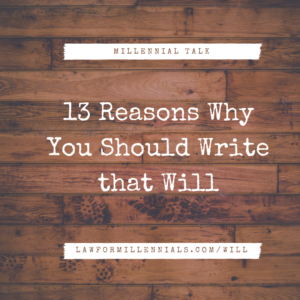
I know that for millennials, talking about a Will is not the easiest subject, seeing how the most of ‘us’ have Jay-Z’s “Forever Young” on a loop in our ‘favourites’ playlist.
In fact, tell a millennial that they should have a Will and the reaction you are likely to receive will be something akin to:
“I have nothing to give away.”
“It all goes to my spouse anyway.”
“I’ll do it when I have kids.”

But the hard reality is that life happens. Or, in this case, death does. To quote B. Franklin “in this world nothing can be certain, except death and taxes.”
So this is certain, sadly and morbidly, you will die (sorry not sorry, be prepared).
So I am here to remind you why you should prepare for this certainty and here are my reasons why:
Your Creepy Uncle

You remember him; the one who scares you with the weird incantations whenever you visit during family holiday dinners, and totally gives you the heebie jeebies?
Well, imagine you passed into the sunny-after life, and by some weird stroke of ill-humoured fate, he ends up being the decision-maker over your estate.
In your will (when you make one) you appoint an estate trustee, who is the executor and handles the administration of your assets (stuff).
When you don’t make a will, it means you die intestate. Now, there is a “priority system” of people who will be your estate trustee when you didn’t make that will, starting with your spouse (married/common law), next of kin, or both the spouse and the next of kin (s. 29(1) of the Estates Act).
So you might think – oh it will be my boyfriend/husband, girlfriend/wife, or mom/dad/sister/brother/grandma. But not always, in fact, the court has discretion to appoint an executor and this “priority system” might just constrain the courts role (s.29(3) of the Estates Act) (Mohammed v Heera).
Yes. Without a will you are leaving this job in the hands of the court, and your creepy uncle may just seem to be the best guy for the job, and cause family drama in his attempt to divide up your debts/condo/personal effects (laptop, car, dog – yes dog is property.)

Someone also has to pay the taxes (like I said, death and taxes) and it is easier to know who that person is when they are appointed in the will. Be kind to your family. Don’t make them fight over this. Also, they may not have to go through a whole next level technicality – applying for certificate of appointment of estate trustee without a will.
Perhaps the most important reason to appoint an executor you trust? It will be this person dictating your burial.
(Oh the sheer horror!)

You can’t put in your will how you want to be buried.
Well, you can, but it wouldn’t be binding on your estate trustee (ie. matter) because your estate trustee has discretion over how to bury you. As long as it is done in a dignified manner (and follows The Criminal Code, R.S.C., 1985, c. C-46 (Federal) and the Funeral, Burial and Cremation Services Act, 2002, S.O. 2002, c.33 (Provincial)).
So think carefully about who you want to act as your estate trustee! Pick someone you trust and make a will so creepy uncle will stay far far away.
Your better half

As millenials, the concepts of “marriage” and “spouse” and “partners” and “living together” have all assumed rather blurry lines in today’s world. This is especially as (sometimes) we actually begin the arrangement of living together as more of a business-decision to reduce the bills.
Along the way, it just may turn out that we were lucky enough to find the person of our dreams in the process.
The sad thing however is that in some cases (and depending on the laws of the particular jurisdiction) the person we consider in our hearts to be our “better half” may not actually be elevated to that position in the eyes of the law.
What we may have thought as a common-law marriage automatically entitling this most loved person to (rightfully) inherit our possessions, may be interpreted by the law to have been nothing more than a beautiful “situationship,” which only gives them access to crying at the front seats of the memorial service.
If you don’t have a will, your common-law partner gets nothing at the outset. They have rights to start a lawsuit and claim that they were your dependant and require support (Part V of the Succession Law Reform Act (SLRA), s.58(1)).

Litigation (suing someone) is expensive and there is a limitation period to start the application for dependant’s support which is six months from when the certificate of appointment of estate trustee is issued (SLRA s.61(1), see blog post on limitation periods).
Now, the next question is: would your loved one be considered a dependant? (Two-step definition found in section 57 of the SLRA). Are they a spouse, parent, child, or sibling? Were they supported by you immediately before you sadly died (because you are mortal)?
Spouse is defined as a former spouse (yes, an ex), common-law spouse, or same-sex spouse who you lived with continuously for not less than three years (Part V of SLRA ss.57 and 1(1) – 2).
Newly engaged whirlwind romance? Ariana Grande and Pete Davidson? You need a will to make sure they are taken care of. Their only recourse otherwise would be to make a dependant support application and if they don’t fit the definition of a dependant, then they likely get nothing.
Your Little Angels

Contrary to what Hollywood-esque legal-drama blockbusters would have you believe, you are not able to ABSOLUTELY determine the appointed guardians for any under-adult children you may leave behind.
The law is at all times pre-occupied with the best interests of your children (section 24 of the Children’s Law Reform Act (CLRA)).
But you can specify in your will as to the person(s) you want to have temporary custody of your children. Like the burial thing, you can’t actually say who in your will who will have permanent custody. Permanent custody is up to the courts.
The person you appoint as temporary custody will have custody of your children for 90 days after you die. Anyone who seeks permanent custody must apply for it (s.21 CLRA).
As the court is the ultimate decision maker, it is helpful to have an appointment under a will and even a piece of paper that you give to your lawyer which explain the reasons you wanted to leave your child with said person and why it is in the best interest of your child.

Now you know
So now you know why it is important for you to make a will, even though we know that you will live until the end of time.
It does not matter that you may still be a broke, struggling millennial (see blog on debt); your breakthrough could just be a minute away, and in the meantime, you may just want to make sure your doting boyfriend/girlfriend you are totally going to marry or your fiancé you’ll marry eventually, or your newborn or all the other people in your lives are considered when you’re not around.

Whatever the case may be, you should have a will. If it will make you feel better, knock on hard wood three times after properly executing the will and tell yourself you’ll live forever and ever and ever and ever and ever…

1 thought on “13 Reasons Why You Should Write That Will”